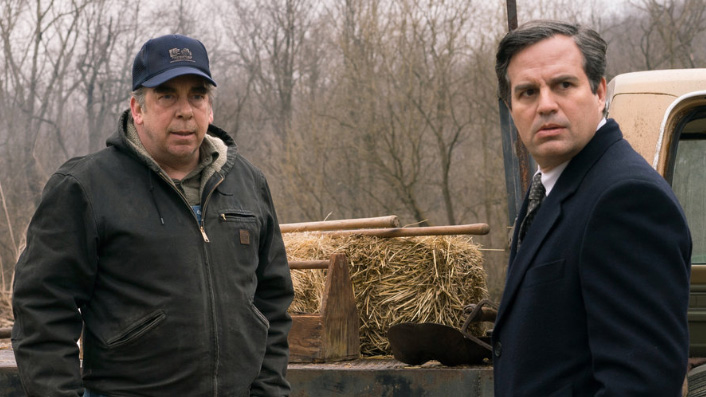Dark Waters is a competently told, sometimes chilling, legal thriller
Even with Todd Haynes directing, doesn’t do much to distinguish itself.

Three-time Oscar nominee Mark Ruffalo leads Todd Haynes’s exposé thriller Dark Waters, playing the real-life corporate defense attorney who took on the DuPont chemical company over terrifying impacts from its chemicals.
Despite solid performances, it’s a competently told tale, writes Steve Newall, but one that doesn’t do much to distinguish itself from other legal dramas outside of its subject matter.
Todd Haynes (Carol) turns his hand to the legal thriller genre with corporate exposé Dark Waters, a non-showy retelling of a long-running campaign for, if not justice, some level of atonement. Detailing the real-life dogged pursuit of chemical company DuPont by environmental lawyer Robert Bilott (Mark Ruffalo at some of his most persistent and sympathetic), the film begins as a fairly familiar David v Goliath tale but evolves into a chilling tale of industrial malfeasance. As the film opens, Bilott is a corporate defense attorney, recently made partner at a prestigious establishment law firm, who takes on what’s a somewhat unusual case for a firm usually representing big business. After meeting with a farmer seeking an explanation for his dead livestock, Bilott finds himself beginning to get offside with his corporate peers, including DuPont attorney (Victor Garber), whose relationship with Bilott sours as DuPont does their best to stymie his legal and investigative efforts.
Uncovering a pattern of evidence to suggests DuPont dumped dangerous chemicals, Bilott’s pursuit of the truth leads him to a series of terrifying discoveries about the chemical giant’s knowledge about toxic effects on their employees and the American public. Haynes depicts the evolution of this investigative obsession—which would span nearly two decades and put him at odds with some of his fellow legal firm employees—in economical fashion, charting its impact on Bilott’s wellbeing and personal life effectively while not leaning too hard on the melodrama (though one may find Anne Hathaway’s performance as Bilott’s wife somewhat at odds with Ruffalo’s measured turn, and Tim Robbins’s patient work as Bilott’s surprisingly supportive boss risks being undone in a table-thumper of a speech about the meaningfulness of the legal profession, dammit).
There’s as much shocking information dumped on us by the film as DuPont deposited in a landfill next to (at the time, still healthy) cows, and it will be familiar to viewers of 2018 NZIFF documentary The Devil We Know, which also revealed the same mind-boggling material. Given the presumably limited audience of the doco, it’s a welcome development to see Dark Waters bring the same matters to wider attention, and the Bilott family perspective is a good one to have, framing this within familiar dramatic territory. Haynes’ restrained direction fits this mould, doing little to draw attention to itself beyond moving the story along. By the time he gets to showing Bilott’s actions are not without consequences to communities who find themselves adversely affected by DuPont in different ways, you may be forced to consider if there are any winners to be had in cases like these. And while Dark Waters may be watchable enough, and its true story rage-inducing, there’s a reason it didn’t trouble awards season as a winner (or even contender) itself—a competently told tale, sure, but one that doesn’t do much to distinguish itself from other legal dramas outside of its subject matter.






















